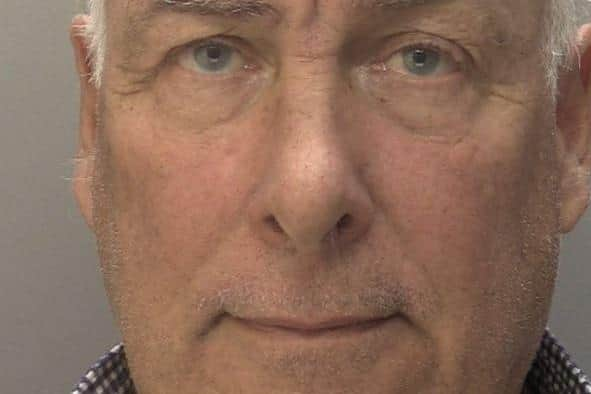Yorkshire solicitor and landlord, 63, who ran huge cannabis growing operation from his property portfolio jailed - and notes from brave Neighbourhood Watch co-ordinator helped bring him to justice
Jeremy William Southgate, 63, brought stress and misery to residents of a number of streets in Hull, where he owned a total of 72 houses – 17 of which were found to contain cannabis farms.
He installed ‘ghost tenants’ in the properties, which were then taken over for drugs cultivation for an operation that generated millions of pounds a year in profit. The electricity supplies were bypassed.
Advertisement
Hide AdAdvertisement
Hide AdSouthgate recruited a number of Albanian men, including Florjan Kasaj and ‘area managers’, cousins Dardan and Ervis Mrishaj, who looked after the properties. A fake student lettings agency which rarely opened to the public, Anderson Estates, acted as a front and was run by Kasaj with false adverts in the windows.


The ‘workers’ would meet Southgate, a trained solicitor who also owned a care home in Brough, in Costa coffee shops for instructions.
The outwardly respectable businessman, who apparently gave up a career in law to instead buy properties to let, lived in the village of Welton, near Brough in East Yorkshire, and owned a pleasure cruiser called Billy Blue that he berthed at Hull Marina. Over £50,000 in cash was found hidden aboard the boat, which he was living on at the time. Other stashes of cash were discovered inside his Brough properties, on Lady Anne Way and Welton Old Road.
The gang were found guilty of various offences at trial and returned to Hull Crown Court on Monday for sentence.
Advertisement
Hide AdAdvertisement
Hide AdProsecutors told Judge Mark Bury in their final submissions that Southgate played a ‘leading role’ in the conspiracy to produce the drug, though it was accepted that he was not involved in the onward distribution of the cannabis, which was sold by a wholesaler.


The CPS said Southgate ‘directed and organised’, and had a ‘substantial influence on others in the chain’. He used his legitimate business interests as a cover for his activities.
The court was told Southgate made around £11million per year, but that it was difficult to prove how much of his income came from crime, as he did not keep a rent book and was ‘eccentric’ in his approach to accounting.
He continued to recruit others to grow cannabis while on bail after he was initially arrested by Humberside Police, and even brazenly applied for Covid loans to help keep his businesses afloat. The court was told one of these grants has been paid back. Government energy grants were used to insulate the cannabis grows.
Advertisement
Hide AdAdvertisement
Hide AdVictim impact statements were provided from a number of neighbours living near to the properties, which were often bought at auction for low sums, whose lives had been affected by the criminality. One, Arthur Moon, kept notes about Southgate after first meeting him, and his records formed the basis of evidence he gave at the trial. Mr Moon, who co-ordinates his local Neighbourhood Watch, said he felt he had been ‘propelled into a world of organised crime’ by the episode and that he was a ‘sitting duck’ who feared his home would be firebombed.
Another man, Darren Hague, had a nervous breakdown caused by the stress of living next door to a cannabis farm, and said it had taken six years for Hull City Council to secure compulsory purchase powers for the property. He recalled Southgate refusing council requests to keep the house clean and tidy and appearing to be ‘above the law’.
Southgate’s defence counsel, Alex Menary, submitted that his client had merely ‘allowed his properties to be used’ for the drugs operation, but Judge Bury disagreed and said that he believed instead Southgate had been ‘approached’ by a criminal enterprise, believed to be Romanian, but had done more than simply ‘turn a blind eye’ to what happened next.
Judge Bury added that Southgate had put himself in a ‘difficult position’ by failing to keep accurate records of income from properties rented to legitimate tenants, but argued that he was not rewarded ‘only’ by rent from the drugs wholesalers, as if that was the case he would have let them to tenants in the normal manner.
Advertisement
Hide AdAdvertisement
Hide AdCharacter references submitted to the court included one from Southgate’s daughter. The father of two has no previous convictions and Judge Bury expressed the view that he would be ‘unlikely’ to find himself in a similar situation again after being released.
The judge was also told that although both Mrishaj cousins are asylum seekers and that Dardan has refused voluntary repatriation in order for his claim to remain active, Kasaj has British citizenship and four children born in the UK to his Russian wife.
Sentencing Southgate to 11 years in prison, Judge Bury remarked: “In 2019, you began conspiring with an eastern European organised crime group. You checked on your properties and went about concealing the grows by installing ghost tenants. Your accounting was opaque and almost non-existent, but you were expecting considerable financial advantage – otherwise why do it?
"You were actively involved, though there were people above you who made a greater return. You did not have a link to the head of the group, but you were linked to the senior manager, Florjan Kasaj. You went to great lengths to avoid detection with false or no accounting. Your defence was to deny everything, but your sense of invincible deniability was laid bare at trial.
Advertisement
Hide AdAdvertisement
Hide Ad"You have also been convicted of money laundering; you were given cash for the use of your properties. You were given Covid bounceback loans based on false information you had provided by overestimating legitimate rental income.
"Yet when you were released on bail – and you were fortunate to have been, as your fellow defendants were detained in custody – you bought another property and contacted another man. Your route of deniability was still open to you – you wanted to say ‘it was this other person’. It was a vigilant neighbour, Arthur Moon, who saw you there when the grow was set up and when it was moved before a council visit. He recognised you because you always wore the same hat. The electricity had been bypassed and the street had even been dug up.
"You cannot offer much mitigation and you will find custody hard.”
Kasaj was jailed for seven years, Ervis Mrishaj for five and a half years and his cousin Dardan for three years. All can be deported upon their release.
